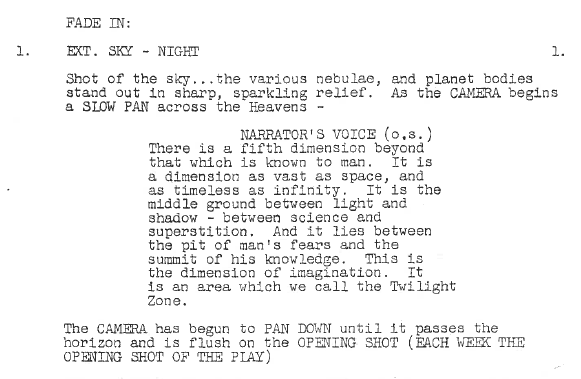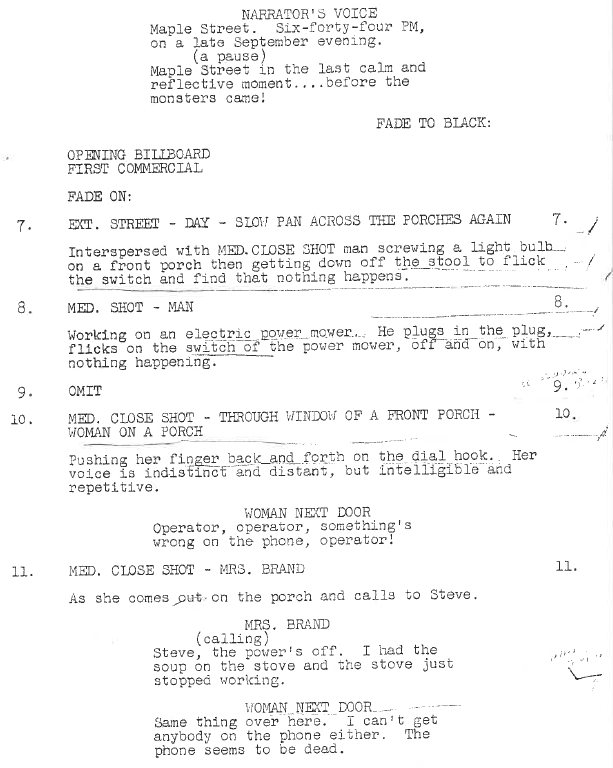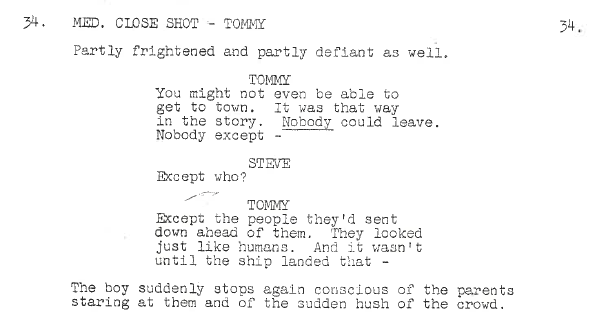The Twilight Zone: Five Observations on Maple Street
Searching for a favorite script to recommend in time for Halloween, my mind wanders back specifically to a season 1 episode of the original TWILIGHT ZONE. One of the most-read classic TV scripts in the WGF Library, “The Monsters are Due on Maple Street” was written by Rod Serling in 1959, airing on CBS in March of 1960.
This script has always been high on my suggested reading list for the way it pointedly examines the nature of monsters -- using them as a metaphor to make candid observations about the nature of humans.
This particular TWILIGHT ZONE story deals with bizarre occurrences that happen on a small neighborhood street after what looks like a meteor flashes through the sky. Astute fans might recognize how the Duffer Brothers pay tribute to this episode as “Maple Street” is the location of the Wheeler and Sinclair houses in STRANGER THINGS.
Indeed, after the quick streak, light or meteor across the sky, strange things DO happen on Maple Street – and the street’s residents begin to look for a cause or culprit.
Said H.P. Lovecraft famously:
“The oldest and strongest emotion of mankind is fear, and the oldest and strongest kind of fear is fear of the unknown.”
For me, what has always separated horror from, say, an average mystery or action story is this element just outside the realm of the knowable and the conscious. Things we can’t explain – aliens, monsters, apparitions, demons -- are inherently terrifying because… if you can’t know it, you can’t beat it. This is the place where Rod Serling takes us in THE TWILIGHT ZONE.
According to Devendra Varma, who was an expert in gothic literature, the difference between terror and horror is “the difference between awful apprehension and sickening revulsion.” This is to say that terror is the emotion we feel when we know something unimaginably awful is going to occur; horror is the emotion we feel when we sit in the realization that something unimaginably awful has just happened. The reason “The Monsters are Due on Maple Street” is an exemplary script lies in how Serling takes us from terror (anticipation) to horror (realization).
Like all the great episodes of THE TWILIGHT ZONE, this is a one-two stomach punch – like a macabre Aesop fable.
In the vein of Arthur Miller’s witch-hunting play, THE CRUCIBLE (which premiered on Broadway nearly eight years before “Maple Street” aired) Serling explores how, as people, we can often be our own greatest enemies; how in the face of things which can’t be explained (like a power outage), humans are quick to point fingers, blame and ultimately sacrifice each other.
This commentary on human nature remains achingly accurate, especially at this point in history. At the urging of a little boy who’s read one too many alien comics, the adults on Maple Street start to look for an alien enemy among themselves. When the power goes out and the phone lines go dead and the cars won’t start, there must be a person at fault. As viewers, we watch the proverbial dominos fall.
A person’s harmless idiosyncrasies suddenly become evidence of a threat to the neighborhood. Our fellow humans become potential aliens or monsters – and their human face is a mask they wear to fit into society, but their main objective is to take us down. Aliens or demons infiltrating our collective or personal consciousness has always been a terrifying prospect to us.
We want to stay a part of the tribe, so we’re quick to join the mob in their scapegoating. Heaven forbid, we should be the next person to get blamed.
When we’re afraid, our ability to reason gets completely shattered and we’re more likely to do or believe something irrational or illogical.
Finally, people can become so fearful and distrusting, that they result to killing their fellow people. That’s what happens at the end of “Maple Street.” To be honest, with everything going on in the world, I find this conclusion a little too truthful for comfort.
Ultimately, in this episode, the aliens behind the weird, unexplainable occurrences understand human nature. They understand how to conquer by dividing. They know that when we grow dissatisfied turning against one person, we’ll turn against another – and it’s only a matter of time before we destroy ourselves in the process. Terror leads to horror.
It’s an exemplary script to read in trying to understand how horror, sci-fi and fantasy can be used as metaphor for very real-world issues. What better time to give actual contemplation to the various masks that humans wear than by temporarily entering into THE TWILIGHT ZONE?
Looking for more spooky scripts? As always, search the WGF Library catalog.







